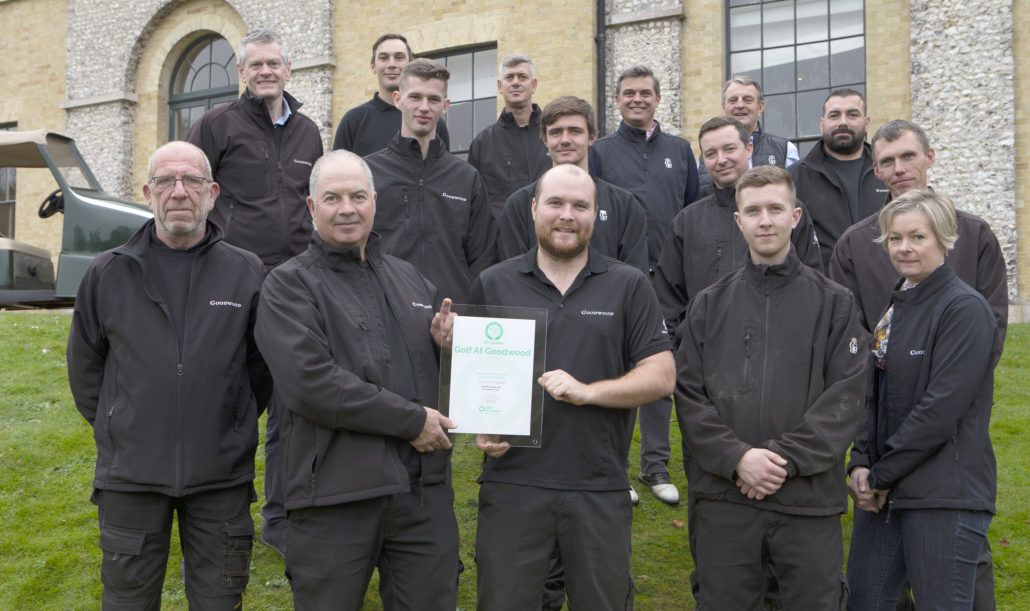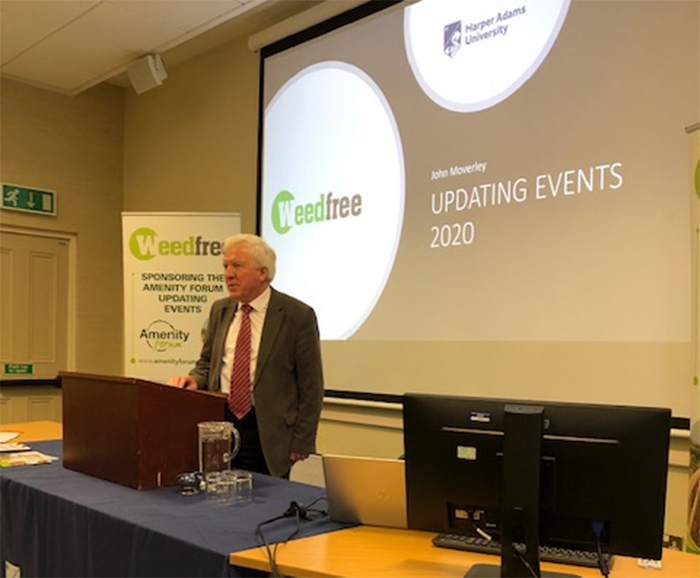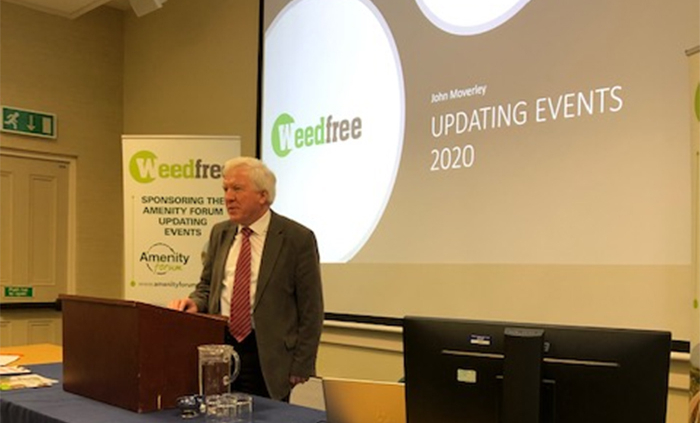A Great Place To Be: Scott MacCallum catches up with Phil Helmn, the man with the most diverse job in turf management…
I often interview turf managers at multiple use venues and marvel at their ability to switch from preparing a high quality cricket pitch to mastering the intricacies of marking out a 400 metre athletic track. However, I have just spoken with a turf manager for whom no turf related scenario is out of bounds.

Phil Helmn is General Manager Sports Turf Grounds and Gardens at the iconic and wonderful Goodwood Estate and in addition to managing the golf courses, the cricket pitches, and all the areas around the famous house, at the hotel he also has kennels under his remit, and has to ensure that the grass airfield is functioning well and entirely safe for aircraft to land.
Oh yes, and he must ensure that the grass in the Estate fields operates at maximum yield for the cattle and sheep to eat while at the same time ensuring that the surface is strong enough, and of a suitable mixture, to recover from hosting marquees and structures which form part of the many huge events held at Goodwood.
Unless anyone can tell me differently I can’t think of any turf manager dealing with such a diverse portfolio, even allowing for the fact that Phil’s extensive remit doesn’t stretch as far as that other iconic Goodwood feature – the racecourse.
“That might be true, but I can’t honestly say I’m winning at any of it,” laughed Phil, for whom the comfort zone was very much golf course management until his talents, ability to take on challenges and manage a large team was identified by the Goodwood Directors and his job grew.
“We are, however, all working hard to ensure we get the best results we can.” Phil arrived at Goodwood five years ago as Course Manager for the Parks and the Downs 18 hole courses.
“I was promoted two years later and now have a team of 30 full time and 15 seasonals in the summer to look after all aspects of our grounds and sports facilities. The whole site is 12,000 acres, much of it forestry, but that’s a heck of a lot and even with 45 staff in the summer it’s not really enough. We could really do with more.”
Phil is in charge of six departments in total – Simon Berry is Head Greenkeeper for the Parks Course; Rob Dyer for the Downs Course; Andy Boxall is the Head Groundsman for the Airfield and the Main Grounds; Richard Geffin is the Head Groundsman for the cricket; Adrian Gale is the Head Mechanic and Georgina Page is the Head Gardener. He himself reports to Adam Waterworth, Goodwood’s Sports Director. Ultimately they all report to the Duke of Richmond, whose vision was the current Goodwood Estate back in the early 1990s and whose ability to harness a high quality team made it all happen.

Phil meets with each Departmental Head on a one to one basis every week and while keeping on top of things is manageable, balancing the ying and the yang of the job is a task.
“A golf green has to perform differently to a cricket wicket and they both have to perform differently to a grass runway. The lawns are all different too, and then there are the fields where there is a conflict between parking 10,000 cars for a Festival of Speed or a Revival, and having grazing sheep and cattle. I have to learn about the right grass for a dairy herd so that they produce more milk or that sheep can be sold to market earlier.”
As for that runway, “MJ Abbott were contracted to level it recently. It is predominately rye grass with elements of the new tetraploids to assist with wear and tear,” he revealed.
While the diversity of challenge is what keeps his juices flowing it was golf which was his calling card into Goodwood.
“I grew up with golf, my dad was the pro at Morecambe Golf Club and I went to Myerscough College to study turf management,” explained Phil, whose career took him to the States and Cyprus before working on a new project at Heythrop Park, in Chipping Norton. From there to Goodwood, initially to manage the two golf courses. Phil attributes much of his success at Heythrop to the quality of his greens.
This is where he worked initially with David Snowden of Agronomic Services Ltd. With this target in mind, when he arrived at Goodwood, he chose to call upon Agronomic Services Ltd once more and work again with David Snowden, whom he describes as an extended member of the team.
“He’s a very clever man, and while he doesn’t wear a Goodwood t-shirt we definitely see him as one of our team. Phil jokes, “perhaps we should get him a Goodwood t-shirt.”
“The mind set I had at Heythrop was that it was all about the greens. If you can get them right most greenkeepers will tell you that you are pretty much on a winner. So, with David’s expertise, we worked out the best programmes based on Ana-Lync and we really got them singing. It was satisfying to see that when I left, they were in lovely condition,” explained Phil.

“Coming to Goodwood I had a great working relationship with David and knew that the products he used would definitely make a difference. Hey presto we’re five years in and we have achieved what we were looking for from our greens.”
“Heythrop was a complete new build 80-20 fen dress to a USGA spec. Here The Downs course is on pure sand on top of a chalk hill so it’s extremely challenging. The Parks course is a different beast, a standard 70-30 mix and much easier to manage. We describe it as a mellow pensioner whereas the Downs is a temperamental teenager.
With two courses which are almost polar opposites Agronomic Services Ltd had to find two different types of solutions for separate growing conditions and different soils on the two courses, which each raised their own unique challenges. David works very closely with Simon and Rob communicating on a regular basis and bringing his expertise, combined with the work and day to day knowledge of the Head Greenkeepers and their teams.
Producing the desired results certainly didn’t involve a one-size- fits-all approach. Regular course walks with David, followed by soil and water testing utilising Ana-Lync for reporting and analysis, and then the creation a bespoke roadmap (Turf Action Plan) for each course, individually. The constant and combined monitoring of the course by the Head Greenkeepers and the team and the technical support, all come together to create excellent results.
The Downs was tackled with a combination of RZA Ceramic Granules, Eon Bio and soil enhancers, which enabled ‘tied up’ elements to become unlocked and therefore available in the rootzone.
“The products are great. They do exactly what they say on the tin and with David’s skill in combining them, it means that we can fine tune to exactly what we need. They are definitely the Rolls Royce of products – not cheap but I made savings elsewhere within my budget so I knew that I could have the control we need using the Floratine foliar feeds, combined with Agronomics soil liquids.”
While the work with Agronomic Services allows them to control the controllables Phil knows there is much more he can’t do anything about. “I know sports turf people will be able to empathise with me. My moods swings are tied in to the weather. If it’s good grass growing weather I’m usually pretty chipper but if it’s too dry or too cold I’m in a much lower mood.
“But what I’ve noticed most here is that if I’m praying for rain because I want to put on some fertiliser on the golf course I also need it to be dry over on the runway or the fields because I want those areas to be dry to peak. There is no perfect weather now for me now there are so many different areas with different needs.”

However, with a glass half full rather than the reverse approach, Phil is adjusting his thinking.
“I’ve learned that whatever the weather it doesn’t matter. If it’s wet it’s going to suit the golf and if it’s dry it’s ok because I can do some topdressing. The area we look after is so huge each area will need different things. No matter the weather it’s ideal for something! So, to be honest, it’s fine I just have to take it as it comes.”
With the great and the good, not to mention the “A” list stars converging on Goodwood on a regular basis, particularly for the Festival of Speed and the Revival events, Phil has to pinch himself that he is a key part in the success of it all.
“It’s probably the best place I’ve ever worked, and I have worked at some lovely places and I’ve had a blast in my career, but the culture here on the Estate is fantastic, the diversity of what we deal with is also fantastic. But it is the culture which has got me the most.
It is very nurturing full of excitement and enthusiasm – let’s work out how we can do it, rather than thinking we can’t.
“It’s all positive vibes and a ‘Let’s go get ’em” attitude and it suits my personality and character perfectly.”
That’s not to say that he revels in the excitement of mixing with Formula One drivers and Hollywood stars. He never switches off fully.
“The events are wonderful here but, of course, like any greenkeeper will tell you, you walk around with a notepad thinking this will need doing tomorrow and I just get the lads to do that. Maybe a marquee could be moved six inches because it’s nudging up against a hedge. It goes with the territory. Even when you are off duty you are thinking ‘That’s going to be a mess when they take that tent down’.”
Speaking with Phil you do get the feeling that no matter what he is left to clean up at Goodwood he will do so with a broad smile on his face.






















